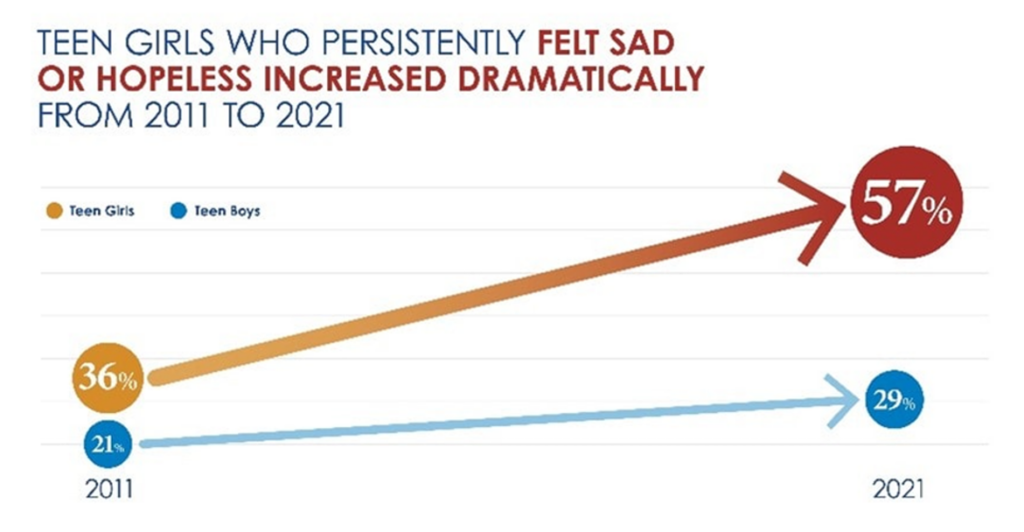According to the CDC, 1 in 3 teen girls have had serious suicidal thoughts. Rates of depression and anxiety have been increasing particularly among teens. While the pandemic made things worse, this was true even before the pandemic. Why, what is happening? Most of the discussion centers around social media use and bullying. While those are undoubtedly factors, I will show that consumerism is the hidden underlying cause of our children’s mental health crisis.
How Mindless Consumerism Causes Mental Health Crisis
Mindless consumerism, or the preoccupation with the acquisition of material goods and services, is the problem. How so? In the first place, mindless consumerism has led us to buy conveniences to the point that we have engineered out the meaningful use of our legs for ambulation. The garage is a big convenience. But garages automatically imply driveways and roads built to every single household. We’ve made exercise unnecessary and further made the outdoors unnecessary. Thus we spend 90% of our time indoors in increasingly artificial environments whereas we evolved in and our best suited to live in natural environments. It’s easy to forget that for the majority of our time, Homo sapiens spent 100% of their time outdoors.

Today, 75% of teens do not meet the recommendations for adequate exercise. We also confine children to indoor settings for the large part of the daytime. They are to sit still for most of that time. They get into trouble should they attempt to move around. They are expected to fight their natural inclination for movement. Children today can easily spend their entire day confined indoors between school and home. While not an actual medical term, nature deficit disorder has a big impact on the developing mind.
Poor Nutrition A Factor
Moreover, mindless consumerism leads adults to become dependent on employers for their day to day living. Today our homes are nearly three times a large as they were a hundred years ago. It is filled with more “stuff” than ever. What this means is that we adults don’t have the time to prepare a nourishing meal for ourselves and our family. For many of us, breakfast is typically just coffee or a breakfast taco on the go. Given the time constraints, for our children breakfast is often prepacked sugary cereals or perhaps waffles and syrup. Likewise, their school lunches are equally poor in nutrients. Today, a shocking 60% of our calories (and 70% of our children’s calories) come from highly processed foods. Nutritious food is of course another a key ingredient to good mental health.
Hunter Gatherers Mental Health
In contrast, there are still examples of people who consume very little. Modern day hunter gatherers appear to have excellent mental health. Their diets are nutritious unless except when scarcity is a factor. They move around constantly. They spend nearly all of their time in natural outdoor settings. That also promotes good sleep at night and eases stress. Moreover, since they live in small groups or tribes of people, they richly rewarded with social interaction which is another key element of good mental health.
This is not of course a call to return to the stone ages. Starvation was a real threat in those days and safety and security was not up to current standards. The point is we could all be so much better off than we are if we were to become mindful consumers. Moreover, instead of promoting consumption to fuel endless GDP growth as our politicians (both on the left and right) are keen to do, we ought to be promoting well-being. We are a people, not a machine used to become increasingly productive. Our children are suffering, we cannot continue along the same path. Its time for paradigm shift to our way of living.

